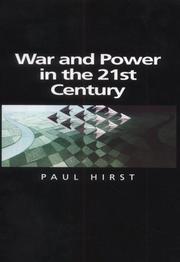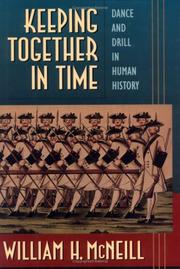| Listing 1 - 8 of 8 |
Sort by
|
Book
ISBN: 9781501109867 Year: 2017 Publisher: New York Simon & Schuster
Abstract | Keywords | Export | Availability | Bookmark
 Loading...
Loading...Choose an application
- Reference Manager
- EndNote
- RefWorks (Direct export to RefWorks)
The Internationalists tells the story of the Peace Pact by placing it in the long history of international law from the seventeenth century through the present, tracing this rich history through a fascinating and diverse array of lawyers, politicians and intellectuals--Hugo Grotius, Nishi Amane, Salmon Levinson, James Shotwell, Sumner Welles, Carl Schmitt, Hersch Lauterpacht, and Sayyid Qutb. It tells of a centuries-long struggle of ideas over the role of war in a just world order. It details the brutal world of conflict the Peace Pact helped extinguish, and the subsequent era where tariffs and sanctions take the place of tanks and gunships. The story of how an overlooked 1928 treaty was among the most transformative events in modern history. On a hot summer afternoon in 1928, the leaders of the world assembled in Paris to outlaw war. Within the year, the treaty signed that day, known as the Peace Pact, had been ratified by nearly every state in the world. War, for the first time in history, had become illegal the world over. But the promise of that summer day was fleeting. Within a decade of the signing of the Pact, each state that had gathered in Paris to renounce war was at war. And in the century that followed, the Peace Pact was dismissed as an act of folly and an unmistakable failure. This book argues that that understanding is inaccurate, and that the Peace Pact ushered in a sustained march toward peace that lasts to this day. [This book] tells the story of the Peace Pact by placing it in the long history of international law from the seventeenth century through the present.
#KVHA:Geschiedenis --- #KVHA:Wereldgeschiedenis --- #KVHA:Oorlogsgeschiedenis --- #KVHA:Peace Pact
Book
ISBN: 9789086794423 Year: 2012 Publisher: Utrecht Omniboek
Abstract | Keywords | Export | Availability | Bookmark
 Loading...
Loading...Choose an application
- Reference Manager
- EndNote
- RefWorks (Direct export to RefWorks)
Ancient history --- Polemology --- World history --- Histoire militaire --- Krijgsgeschiedenis --- Militaire geschiedenis --- Military history --- Oorlogsgeschiedenis --- Battles --- History

Abstract | Keywords | Export | Availability | Bookmark
 Loading...
Loading...Choose an application
- Reference Manager
- EndNote
- RefWorks (Direct export to RefWorks)
Histoire militaire --- Krijgsgeschiedenis --- Militaire geschiedenis --- Military history --- Oorlogsgeschiedenis --- Military history. --- Europe --- History [Military ]
Book
ISBN: 9789058269379 Year: 2013 Publisher: Leuven Davidsfonds
Abstract | Keywords | Export | Availability | Bookmark
 Loading...
Loading...Choose an application
- Reference Manager
- EndNote
- RefWorks (Direct export to RefWorks)
Polemology --- World history --- Histoire militaire --- Krijgsgeschiedenis --- Militaire geschiedenis --- Military history --- Oorlogsgeschiedenis --- C5 --- militairen --- Maatschappelijke organisaties en maatschappelijk leven --- Soldiers --- History
Book
ISBN: 0192852817 Year: 1993 Publisher: Oxford Oxford University Press
Abstract | Keywords | Export | Availability | Bookmark
 Loading...
Loading...Choose an application
- Reference Manager
- EndNote
- RefWorks (Direct export to RefWorks)
History of Europe --- Polemology --- Geschiedenis [Wereld] --- Histoire militaire --- Histoire universelle --- Krijgsgeschiedenis --- Militaire geschiedenis --- Military history --- Oorlogsgeschiedenis --- Universal history --- Wereldgeschiedenis --- World history --- History [Modern ] --- 20th century --- Military history [Modern ]

ISBN: 0745625215 0745625207 Year: 2002 Volume: *1 Publisher: Oxford Polity
Abstract | Keywords | Export | Availability | Bookmark
 Loading...
Loading...Choose an application
- Reference Manager
- EndNote
- RefWorks (Direct export to RefWorks)
Collectieve veiligheid --- Collective security --- Histoire militaire --- International security --- Krijgsgeschiedenis --- Militaire geschiedenis --- Military history --- Oorlogsgeschiedenis --- Security [Collective ] --- Security [International ] --- Sécurité collective --- Sécurité internationale --- Veiligheid [Collectieve ] --- Vingt et unième siècle --- Security, International --- Twenty-First century --- War --- International relations --- Disarmament --- International organization --- Peace --- Military historiography --- Wars --- Historiography --- History --- Naval history --- Forecasts --- Forecasting --- Guerre --- Sécurité internationale --- Twenty-first century --- Vingt et unième siècle --- Prévision --- Prévisions

ISBN: 0674502299 9780674502291 9780674040878 0674040872 9780674502307 0674266064 Year: 2022 Publisher: Cambridge, MA
Abstract | Keywords | Export | Availability | Bookmark
 Loading...
Loading...Choose an application
- Reference Manager
- EndNote
- RefWorks (Direct export to RefWorks)
Could something as simple and seemingly natural as falling into step have marked us for evolutionary success? In Keeping Together in Time one of the most widely read and respected historians in America pursues the possibility that coordinated rhythmic movement--and the shared feelings it evokes--has been a powerful force in holding human groups together. As he has done for historical phenomena as diverse as warfare, plague, and the pursuit of power, William McNeill brings a dazzling breadth and depth of knowledge to his study of dance and drill in human history. From the records of distant and ancient peoples to the latest findings of the life sciences, he discovers evidence that rhythmic movement has played a profound role in creating and sustaining human communities. The behavior of chimpanzees, festival village dances, the close-order drill of early modern Europe, the ecstatic dance-trances of shamans and dervishes, the goose-stepping Nazi formations, the morning exercises of factory workers in Japan--all these and many more figure in the bold picture McNeill draws. A sense of community is the key, and shared movement, whether dance or military drill, is its mainspring. McNeill focuses on the visceral and emotional sensations such movement arouses, particularly the euphoric fellow-feeling he calls "muscular bonding." These sensations, he suggests, endow groups with a capacity for cooperation, which in turn improves their chance of survival. A tour de force of imagination and scholarship, Keeping Together in Time reveals the muscular, rhythmic dimension of human solidarity. Its lessons will serve us well as we contemplate the future of the human community and of our various local communities. Table of Contents: Muscular Bonding Human Evolution Small Communities Religious Ceremonies Politics and War Conclusion Notes Index Reviews of this book: "In his imaginative and provocative book. William H. McNeill develops an unconventional notion that, he observes, is 'simplicity itself.' He maintains that people who move together to the same beat tend to bond and thus that communal dance and drill alter human feelings." --John Mueller, New York Times Book Review "Every now and then, a slender, graceful, unassuming little volume modestly proposes a radical rethinking of human history. Such a book is Keeping Together in Time. Important, witty, and thoroughly approachable, [it] could, perhaps, only be written by a scholar in retirement with a lifetime's interdisciplinary reading to ponder, the imagination to conceive unanswerable questions, and the courage, in this age of over-speculation, to speculate in areas where certainty is impossible. Its vision of dance as a shaper of evolution, a perpetually sustainable and sustaining resource, would crown anyone's career." --Penelope Reed Doob, Toronto Globe and Mail "McNeill is one of our greatest living historians. As usual with McNeill, Keeping Together in Time contains a wonderfully broad survey of practices in other times and places. There are the Greeks, who invented the flute-accompanied phalanx, and the Romans, who invented calling cadence while marching. There are the Shakers, who combined worship and dancing, and the Mormons, who carefully separated the functions but who prospered at least as much on the strength of their dancing as their Sunday morning worship." --David Warsh, Boston Sunday Globe "[A] wide-ranging and thought-provoking book.A mind-stretching exploration of the thesis that `keeping together in time'--army drill, village dances, and the like--consolidates group solidarity by making us feel good about ourselves and the group and thus was critical for social cohesion and group survival in the past." --Virginia Quarterly Review "[This book is] nothing less than a survey of the historical impact of shared rhythmic motion from the paleolithic to the present, an impact that [McNeill] finds surprisingly significant. McNeill moves beyond Durkheim in noting that in complex societies divided by social class muscular bonding may be the medium through which discontented and oppressed groups can gain the solidarity necessary for challenging the existing social order." --Robert N. Bellah, Commonweal "The title of this fascinating essay contains a pun that sums up its thesis" keeping together in time, or coordinated rhythmic movement and the shared feelings it evokes, has kept human groups together throughout history. Most of McNeill's pioneering study is devoted to the history of communal dancing.[This] volume will appeal equally to scholars and to the general reader." --Doyne Dawson, Military History "As with so many themes [like this one], whether in science or in symphonies, one wonders (in retrospect) why it has not been invented before.[T]he book is fascinating." --K. Kortmulder, Acta Biotheoretica (The Netherlands) "This scholarly and creative exploration of the largely unresearched phenomenon of shared euphoria aroused by unison movement moves across the disciplines of dance, history, sociology, and psychology. Highly recommended." --Choice
Drill and minor tactics --- Geschiedenis [Wereld] --- Histoire militaire --- Histoire universelle --- Krijgsgeschiedenis --- Militaire geschiedenis --- Military drill --- Military history --- Minor tacties --- Motor psychology --- Movement [Psychology of ] --- Oorlogsgeschiedenis --- Psychomotor education --- Psychomotoriek --- Psychomotricité --- Universal history --- Wereldgeschiedenis --- World history --- Music --- Rhythm --- Dance --- Movement, Psychology of. --- Musique --- Exercice militaire --- Rhythme --- Danse --- Social aspects --- Aspect social --- Drill and minor tactics. --- Military history. --- Unit cohesion (Military science) --- World history. --- Psychological aspects --- Cross-cultural studies. --- Psychological aspects. --- Unit cohesion (Military science). --- Psychomotricité --- Cross-cultural studies --- Motion --- Psychophysiology --- Motion study --- Movement education --- Muscular sense --- Dances --- Dancing --- Amusements --- Performing arts --- Balls (Parties) --- Eurythmics --- Aesthetics --- Movement, Psychology of --- Poetics --- Cycles --- Movement, Aesthetics of --- Minor tactics --- Soldiers --- Tactics --- Cohesion of units (Military science) --- Cohesiveness (Military science) --- Combat cohesion (Military science) --- Social cohesion, Unit (Military science) --- Unit social cohesion (Military science) --- Military art and science --- Military historiography --- Wars --- Historiography --- History --- Naval history --- Drill
Book
ISBN: 9789401441742 940144174X Year: 2017 Publisher: Tielt Lannoo
Abstract | Keywords | Export | Availability | Bookmark
 Loading...
Loading...Choose an application
- Reference Manager
- EndNote
- RefWorks (Direct export to RefWorks)
Zo'n half miljoen Belgen hebben een familielid dat 'fout' was tijdens de Tweede Wereldoorlog. Aanvankelijk zijn er ruim 400.000 dossiers van verdachten. Zo'n 100.000 burgers krijgen ook effectief een straf: van terechtstelling over vrijheidsberoving tot verlies van rechten. Kleinkinderen en andere familieleden gaan vandaag meer en meer op zoek naar de juiste toedracht van de feiten om dat verleden een plaats te geven. In dit boek reiken oorlogshistorici en archivarissen de sleutels aan om zelf op zoek te gaan naar het vaak onuitgesproken oorlogsverleden.
Archivistics --- Genealogy. Heraldy --- History of Belgium and Luxembourg --- anno 1940-1949 --- Collaboratie --- BPB9999 --- België --- Wereldoorlog II --- Collaboration avec l'ennemi --- BPB1711 --- Seconde Guerre mondiale --- Histoire de la Belgique --- Tweede Wereldoorlog --- Geschiedenis van België --- 930.2 --- #KVHA:Geschiedenis --- #KVHA:Oorlogsgeschiedenis --- #KVHA:Nazisme --- #KVHA:Collaboratie; België --- 930.2 Methoden en technieken van de geschiedwetenschap --- Methoden en technieken van de geschiedwetenschap --- 940.53 --- 949.3.036 --- 940.53 Geschiedenis van Europa: Tweede Wereldoorlog--(1939-1945) (algemeen) --- Geschiedenis van Europa: Tweede Wereldoorlog--(1939-1945) (algemeen) --- 949.3.036 Geschiedenis van België: 2de wereldoorlog; repressie (1940-1945) --- Geschiedenis van België: 2de wereldoorlog; repressie (1940-1945) --- druhá svetová vojna --- toinen maailmansota --- druga svetovna vojna --- Lufta e Dytë Botërore --- Antrasis pasaulinis karas --- Teine maailmasõda --- seconda guerra mondiale --- druhá světová válka --- Zweiter Weltkrieg --- It-Tieni Gwerra Dinjija --- Δεύτερος Παγκόσμιος Πόλεμος --- anden verdenskrig --- război mondial, al 2-lea --- Second World War --- Segunda Guerra Mundial --- andra världskriget --- segunda guerra mundial --- Втора световна война --- Otrais pasaules karš --- wojna 1939-1945 --- Други светски рат --- Втора светска војна --- második világháború --- Drugi svjetski rat --- II maailmasõda --- 2. světová válka --- #KVHA:Collaboratie; België --- Geschiedenis van België --- Geschiedenis van België: 2de wereldoorlog; repressie (1940-1945) --- An Dara Cogadh Domhanda --- Collaborationists --- World War, 1939-1945 --- Research. --- Genealogy --- Archival resources. --- 1939-1945 --- Belgium --- Belgium. --- History --- Research --- Genealogy .
| Listing 1 - 8 of 8 |
Sort by
|

 Search
Search Feedback
Feedback About UniCat
About UniCat  Help
Help News
News